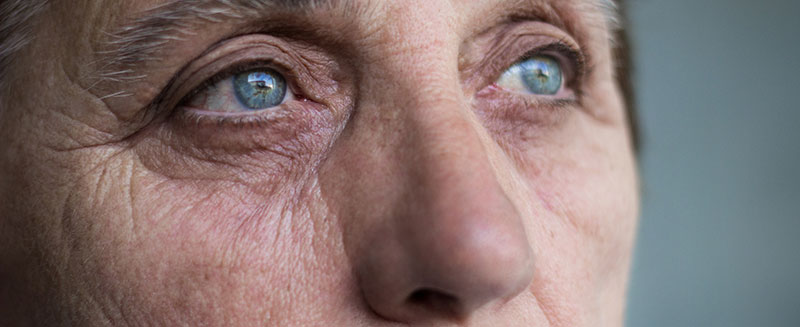
Alzheimer’s disease can affect a person’s eyes in a number of ways.
The intricate, detailed steps connected to making it possible for us to see are amazing. In the blink of an eye, our brains have the ability to take data sent from our surroundings, interpret that information in accordance with feedback from our other experiences, thoughts, and senses and then acquire an understanding of that information to make us aware of what it is we’re witnessing.
It’s no surprise then that Alzheimer’s effect on the eyes may cause misperceptions and visual deficits, particularly in the areas of:
- Depth perception
- Color perception
- Contrast
- Movement recognition
- Peripheral sight
As if that weren’t difficult enough, seniors with dementia may experience an altered sense of reality in the form of hallucinations. To illustrate, imagine a person with Alzheimer’s disease or another type of dementia sees a shadow on the wall. The elderly individual might mistake it for something benign, like the family’s pet cat, or a threat, like a burglar. Further forms of visual misconceptions in dementia might include:
- Misinterpreting their own reflections in a window or mirror for another person. This can lead the senior to think somebody else is there, and in the case of a bathroom mirror, may lead the senior to avoid going in when needed, causing discomfort and distress.
- Thinking that images on the television are real and occurring in the room.
- Problems with sitting in a chair or on the commode, fearing a fall.
- Feeling overwhelmed in overstimulating settings that can cause confusion.
- Reaching out for items that are not there, or missing the mark in attempting to grab something.
- Difficulty with eating and drinking.
Try these tips to assist a senior loved one with dementia who is challenged by vision changes:
- Ensure adequate lighting in the home, and take away any items that are leading to anxiety or visual confusion if at all possible.
- Utilize contrasting colors. For instance, serve a light-colored cream soup in a dark-colored dish.
- Close all window blinds or draperies at nighttime and whenever the sunlight causes a glare.
- Use adaptive devices like remote controls and phones with bigger buttons to help empower the senior to maintain independence in spite of visual difficulties.
At Absolute Companion Care, provider of Alzheimer’s and dementia care in Towson and the surrounding areas, we are committed to making certain the older adults we care for are always safe and thriving. Our highly trained dementia care professionals understand the visual and other changes that occur and are equipped with creative, thoughtful ways to help.
For more information on our in-home dementia care solutions, or if you want to request additional resources related to caring for a senior in the home, contact us online or call us any time at 410-357-9640.
